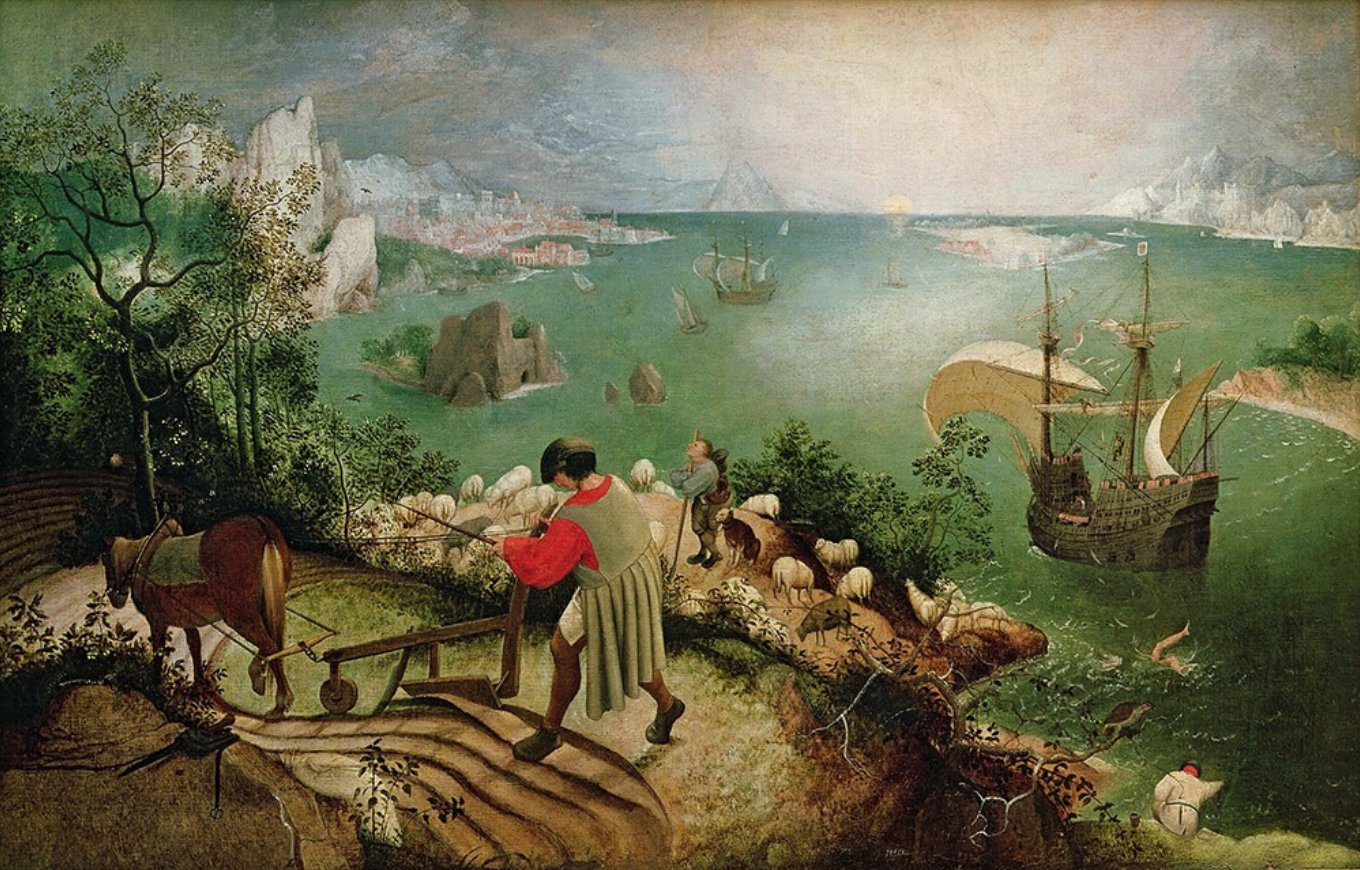Bruegel's Icarus: Cognitive Corona Dissonance
Revealed by retweet or algorithmic fate, these tragedies levitate for a moment in pixels, burn out their short intense lives, before sailing calmly on.
When hundreds of strangers die every day, it's hard to calibrate your grief.
The figures are both too big and too small. Wouldn't some have died anyway? Don't more people die every day from other things? Look outside. The sun is shining. Isn't that the sound of children playing on the field? In a nation of 70 million, a thousand deaths a day doesn't even touch the sides. Each personal tragedy is only an imperceptible ripple, unable to disturb the calm of our small, local pools.
You catch yourself thinking these things, then you take a step back. Don't jinx it. You've been lucky so far. 'God, I know it's been a while. Hope you're keeping well... Just not me or mine, OK?'
The disparity between our knowledge of what is going on and some kind of adequate emotional comprehension provokes numbness. Each additional day brings less understanding than before, almost as if those numbers, despite increasing, somehow add up to less than zero.
The daily hour comes around, bringing its fresh tide of mourning. But in the moment, the scale of it washes over you. It offers nothing in particular for your mind to grasp. Something is wrong, you know that. Something large and real. But whatever it is remains a small, disconcerting worry at the back of the mind, always present, never properly there. Even if you could comprehend it, what would be the point? Tomorrow will bring its own wave. And the day after that, another and another.
Repeated over time, this lack of feeling forms a sensation itself. Today's grief is the uncanny echo of yesterday's loss still waiting to be understood. If it even is 'today'? Because it seems an awful lot like yesterday, which itself resembles tomorrow.
Particular tragedies gleam through the spring haze. The boy buried alone. The nurse dying at post. The newborn bereft of a mother so early in life, she does not even know she had one. Each of these familial catastrophes is an eruption of grief so intimate it punctures the surrounding malaise and grabs our dulled consciences by the throat.
But these tragedies are pitifully transient. Revealed by retweet or algorithmic fate, they levitate for a moment in pixels, burn out their short intense lives, before sailing calmly on. What are you going to do with that pain? Take to the streets? Vote Labour (again)? Your passion and your politics are muted and too late. Anyway, tomorrow there will be more. Pace yourself, friend.
Then there are the deaths we are not counting, or rather the people we have already discounted, back when we believed the disease would come only for the elderly and the infirm - which is to say, people not like us. Now a subsidiary epidemic spreads around our care homes, forcing our attention once more to those we believed had already passed from the land of the well to the land of the dead.
Worse still, the disease has opened the border. We who smugly filed this epidemic under 'not me', offering it good company on the long list of vulnerabilities and misfortunes which we genuinely believed only afflicted other people, can no longer afford such complacency.
There is a poem by W. H. Auden called 'Musée des Beaux Arts' which describes Bruegel's painting 'Landscape with the Fall of Icarus'. In the ordinary rural scene, a boy's upturned legs can just be noticed sticking out of the green sea. The small splash which signifies his fall is easily overlooked by the viewer, just as it is ignored by the figures in the painting.
For the ploughman in the foreground, 'it was not an important failure'. The sun continues to shine, 'as it had to'. The ship, 'that must have seen / something amazing, a boy falling out of the sky / Had somewhere to get to and sailed calmly on.'
This is just how it goes, sometimes. There are always those who do not shift their attention from the pressing mundane to the particular tragedy. Suffering, Auden observes, invariably 'takes place / While someone else is eating or opening a window or just walking dully along.'
I have always read the poem, as the title suggests, as though I were in the gallery, observing the painted figures, themselves noticeably not observing the intimate tragedy unfolding before them. Recently though, I have felt my position change. Coronavirus has populated our world with small but intense sufferings and I have become that 'someone else', who is 'eating' or 'opening a window' to enjoy the warm spring light.
Icarus had his warnings and ignored them. Those of us who are young or well will have thought the same as him, the same thought all young or well people think at all times and everywhere: 'I'll be fine. It won't happen to me.'
Most of us will have been fortunate enough not to regret those thoughts. But regardless of our health, we are all in Bruegel's painting now. A plough in our hand, or on board the ship, we are faced with a problem: in these extraordinary times, do we respond with an ordinary shrug of the shoulders, the inevitable daily round?
Or, if we allow for something different, how do we do it? Between the strange unreality of a suffering so large yet so far away, and the juddering intrusion of those startling narratives of individual pain, how are we to make sense of it all? How do we turn our attention to the disease without making ourselves unwell in turn?
We no longer have the luxury of observing the observers. We are all in the painting now. But when so many strangers die every day, how do we calibrate our grief?









